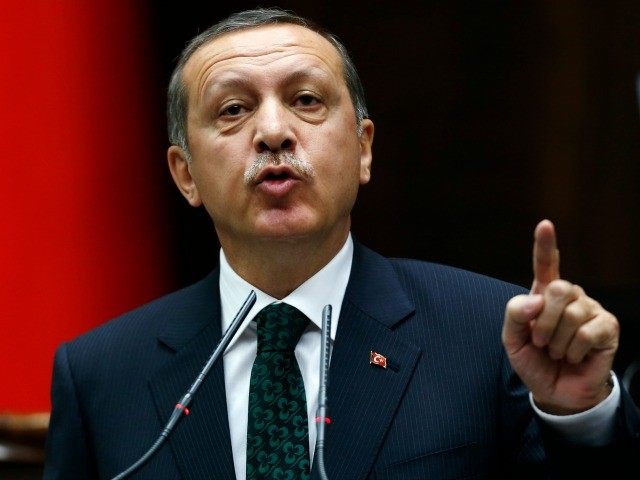Turkish President Recep Tayyip Erdogan, for years one of the most vocal voices against supporting Syrian head of state Bashar al-Assad, said on the record that “a transition process” in Syria involving Assad “is possible.” He is now walking back the statement, asserting that Assad must be overthrown.
“Either a transition process without al-Assad, or with al-Assad, is possible,” Erdogan said on Thursday in Istanbul, following a ceremony for the Islamic holiday of Eid al-Adha. The remark took many by surprise, as Turkey has been adamant about fighting and dethroning Assad, accusing him of crimes against humanity against Sunni Arabs at the start of the Syrian Civil War in 2011.
Erdogan seemed to contradict the statement that a transition with Assad was possible mere sentences later, stating, “Nobody can foresee Syria’s future with al-Assad. It’s not possible to accept a person responsible for killing 300,000 to 350,000 people, a dictator.” He added that he was concerned Assad was trying to carve out a “boutique Syria” out of the land he controls, about 15 percent; the rest is in the hands of the Islamic State terrorist group, Kurdish forces, or al-Qaeda’s al-Nusra Front.
On Friday, Erdogan walked back his initial statements, accusing of malice those who interpreted the phrase “a transition process … with al-Assad is possible” as asserting that a transition process with Assad is possible. “These are malicious quests. My approach about Turkey’s Syrian policy is the same with my term as prime minister,” he told reporters. “If al-Assad has a modicum of love for Syria, he should leave this job and go,” he concluded.
Erdogan had just returned from Moscow to attend the opening ceremony for Russia’s largest mosque. There, he met with President Vladimir Putin, Assad’s most prominent and loyal supporter. Russia has recently intensified its presence in Syria, providing Assad with weapons and vehicles that guarantee a prolonging of the fight between Assad and radical Sunni forces. While Erdogan was in Moscow, his Prime Minister, Ahmet Davutoğlu, remarked that Turkey was watching Russia’s troop movements “with deep concern,” warning that a Russian presence in Syria was “very dangerous.” He said, “İnşallah [God willing] Russia will not insist on ways and methods that will increase the tension.”
Putin has insisted on supporting Assad against the Islamic State, which has become a growing threat in Russia, as well as the Middle East. “There is no other solution to the Syrian crisis than strengthening the effective government structures and rendering them help in fighting terrorism,” he told American news show 60 Minutes, answering, “You’re right,” when asked if he intended to prop up Assad’s regime.
It has been the longstanding policy of the Obama administration that Assad must step down, following his crossing of President Obama’s “red-line” use of chemical weapons on civilians. Following Russia’s invasion of Syria, however, Secretary of State John Kerry said the Obama administration did not believe a solution to the crisis was possible “without the long-term presence of Assad,” an actor necessary for “a political sentiment.”
At least one other European actor has taken the side of talking to Assad: Germany’s Angela Merkel, who said this week that it was important to “speak with many actors” to solve the Syrian crisis and the related migrant crisis threatening European states.

COMMENTS
Please let us know if you're having issues with commenting.